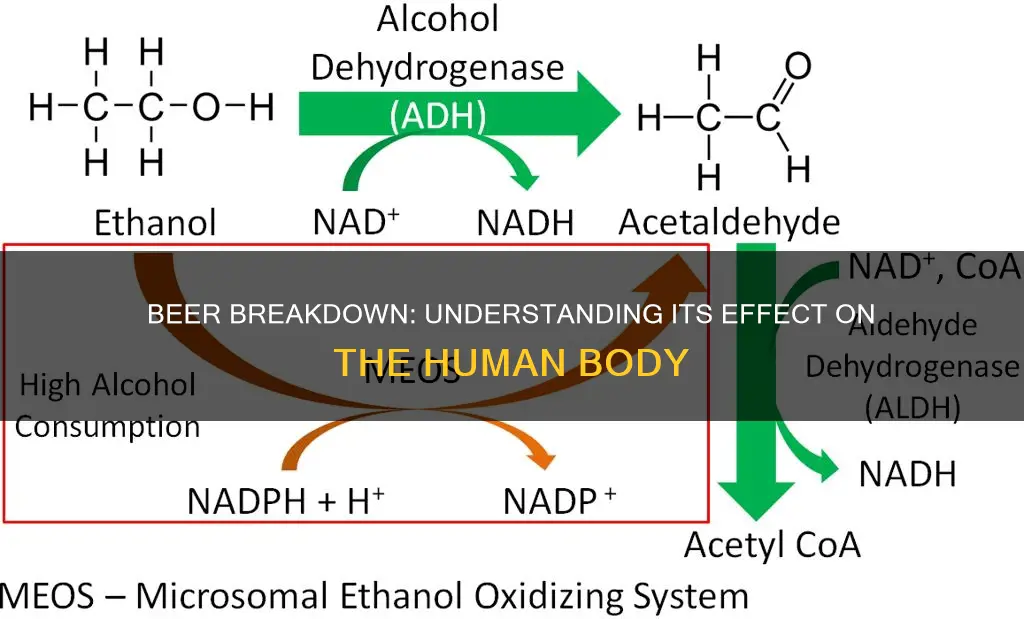
Beer is a popular alcoholic drink that has been consumed for thousands of years, dating back to its discovery in Mesopotamia around 4000 BC. While it has been associated with several health benefits, excessive beer consumption can have detrimental effects on the human body. Beer is made from malted barley and hops, and the alcohol content varies from 0.05% in low-alcohol beers to over 10% in some Belgian beers. When consumed, alcohol is absorbed into the bloodstream from the stomach and small intestine, and the liver breaks it down before it is eliminated from the body. Excessive beer drinking can lead to immediate health issues such as trouble controlling emotions, accidents, violent activities, and alcohol poisoning. Long-term health risks include hypertension, hemorrhagic stroke, immune system weakening, memory problems, and alcohol use disorders. Beer also contains empty calories, which can contribute to weight gain and obesity, further increasing the risk of heart disease and other health issues. Understanding the impact of beer consumption on our bodies is crucial to making informed decisions about moderate and responsible drinking.
What You'll Learn
- Beer is absorbed into the bloodstream from the stomach and small intestine
- Beer contains empty calories, which can lead to weight gain and obesity
- Beer can alter your body's biology, including DNA and hormones
- Beer affects the brain, causing drunkenness and impairing major functions like breathing and heart rate
- Beer can have both positive and negative effects on heart health

Beer is absorbed into the bloodstream from the stomach and small intestine
Alcohol, including beer, is a drug that enters the bloodstream through the stomach and small intestine. Beer is unique in that it contains a large number of nutritive components, including vitamins (particularly B vitamins) and minerals (especially selenium and silicon). Beer also has a high potassium-to-sodium ratio, typically 4:1, and provides dietary fibre.
The ethanol in beer significantly contributes to its calorie content, at 7Kcal/g. Additionally, 25% of the starch in beer is partially degraded and present in a non-fermentable form, adding further calories. These extra carbohydrates are largely absent from low-alcohol beers. Beer also contains hops, which impart a bitter taste.
Beer, like other bitter-tasting drinks, stimulates the appetite. The hops in beer have long been recognised for their preservative action. Beer also contains higher levels of proanthocyanidins, epicatechin, and ferulic acid than wines, and similar levels of quercitin, coumaric, and gallic acids. These higher levels of epicatechin and ferulic acid are believed to be responsible for beer's observed antioxidant effects, which exceed those of wine.
Once absorbed into the bloodstream, alcohol circulates throughout the body, affecting all organs, including the brain. The liver breaks down alcohol, but this process has a limited rate and cannot be accelerated. Until the liver metabolises all the alcohol, it continues circulating in the bloodstream. As a result, drinking more than half a drink per hour can lead to intoxication and adverse consequences such as fights and accidents.
Beer Butt Chicken: Does It Work?
You may want to see also

Beer contains empty calories, which can lead to weight gain and obesity
Beer drinking may increase overall body fat in a number of ways, including causing excess calorie consumption, preventing the body from burning fat, and increasing the phytoestrogen content of your diet. Beer contains as many calories as a soft drink gram for gram, so it can add a lot of calories to your diet. Studies have also shown that drinking alcohol can increase your appetite in the short term, causing you to eat more than you otherwise would.
Drinking alcohol can prevent your body from burning fat. This is because your body prioritizes the breakdown of alcohol over other sources of fuel, including stored fat. Regular drinking could therefore contribute to an increase in body fat.
The flowers of the hop plant, which are used to flavour beer, are known to be very high in phytoestrogens. Phytoestrogens are plant compounds that can mimic the action of the female sex hormone oestrogen in the body. It has been suggested that the hops in beer might cause hormonal changes in men that increase the risk of storing belly fat.
Beer is often associated with an increase in body fat, particularly around the belly, commonly referred to as a "beer belly". Weight gain from beer drinking poses a risk for several health issues, including metabolic syndrome, type 2 diabetes, and cardiovascular disease.
Do LCBO Gift Cards Work at Beer Store?
You may want to see also

Beer can alter your body's biology, including DNA and hormones
Beer, like all alcoholic drinks, can alter your body's biology, including DNA and hormones. Alcohol is a drug that is absorbed into the bloodstream from the stomach and the small intestine. It is then broken down by the liver and eliminated from the body. However, there are limits to how fast the liver can process alcohol, and this process cannot be sped up.
Chronic alcohol consumption can lead to significant reductions in S-adenosylmethionine (SAM) levels in the body, which is a methyl donor for DNA methylation reactions. This reduction in SAM levels contributes to DNA hypomethylation, which is associated with the development of cancer and other diseases. Alcohol can also impact histone modifications, such as acetylation and methylation, which play a crucial role in epigenetic regulation and gene expression.
Additionally, alcohol can interfere with the normal functioning of hormones in the body. Hormones are complex molecules that regulate vital functions, including growth and development. Alcohol can alter the production and activity of hormones, leading to disruptions in the body's normal physiological processes.
Furthermore, alcohol can affect the brain, which is an organ that plays a crucial role in regulating hormones and other biological processes. As alcohol reaches the brain, a person begins to feel drunk. This feeling can vary from person to person, but alcohol generally depresses the brain and slows down major functions such as breathing, heart rate, and thinking.
Beer Bar Memberships: Are They Worth the Cost?
You may want to see also

Beer affects the brain, causing drunkenness and impairing major functions like breathing and heart rate
Beer, like any other alcoholic drink, can have a significant impact on the body, especially when consumed in excess. Beer is absorbed into the bloodstream from the stomach and small intestine, and it is then broken down by the liver and eliminated from the body. However, there are limits to how quickly the liver can process alcohol, and this process cannot be sped up. As a result, until the liver has metabolised all the alcohol, it continues to circulate in the bloodstream, affecting all the organs in the body, including the brain.
As alcohol reaches the brain, an individual starts to feel drunk. The specific experience of drunkenness can vary from person to person and even from one situation to another for the same person. However, what is universal is that alcohol depresses the brain and slows down major functions such as breathing, heart rate, and cognitive processes like thinking, vision, hearing, reaction time, movement, and judgment. This is why alcohol can be extremely dangerous. Excessive alcohol consumption can cause an individual's breathing or heart rate to slow down to dangerously low levels or even stop. This condition is known as alcohol poisoning and can be life-threatening.
The effects of alcohol on the brain and vital functions can also lead to other harmful consequences. For example, impaired judgment and slowed reaction time can increase the risk of accidents, falls, and vehicle crashes. Alcohol also affects long-term memory and brain structure, and heavy drinking over an extended period can lead to memory loss, confusion, dementia, and learning difficulties. Additionally, the more an individual drinks, the higher their blood alcohol content (BAC) becomes. A BAC of 0.1% means that one-thousandth of the fluid in the blood is alcohol. At this level, most people will be significantly intoxicated, and their brain may even fail to form new memories, resulting in a "blackout" where they remain conscious but their brain prioritises basic functions like breathing and maintaining heart rate.
While moderate consumption of beer or other alcoholic beverages may have some potential health benefits, excessive consumption is undoubtedly harmful. The detrimental effects of beer are primarily associated with high alcohol levels resulting from heavy consumption. These adverse effects include acute incidents such as pancreatitis, alcohol poisoning, and suicide attempts, as well as chronic issues like cancer, diabetes, hypertension, and cardiovascular disease. Therefore, it is crucial to emphasise that when it comes to beer, moderation is key.
Hoppy Beers: The Secret to Better Beer Bread?
You may want to see also

Beer can have both positive and negative effects on heart health
Beer, like any other alcoholic drink, is absorbed into the bloodstream from the stomach and the small intestine. It is then broken down by the liver and eliminated from the body. Alcohol can have a range of effects on the body, and its impact on heart health is a mixed bag.
On the positive side, studies suggest that light to moderate beer intake may be associated with a lower risk of heart disease. This is due to its ability to improve the antioxidant properties of HDL (good) cholesterol and enhance the body's ability to remove cholesterol. Additionally, moderate alcohol intake might help to slightly raise levels of HDL cholesterol. However, it is important to note that these benefits are only associated with light to moderate consumption, typically defined as one drink per day for women and one to two drinks per day for men.
On the other hand, heavy drinking is linked to negative health outcomes, including heart-related issues. Excessive alcohol intake can lead to high blood pressure, heart failure, stroke, and cardiomyopathy, a disorder that affects the heart muscle. Prolonged drinking can cause alcoholic cardiomyopathy, where the heart-pumping function weakens and the heart enlarges due to long-term heavy alcohol use. Additionally, alcohol can contribute to obesity, which brings its own set of health risks, including an increased risk of heart disease.
While light to moderate beer consumption may have some positive effects on heart health, excessive drinking can have detrimental consequences. As such, it is crucial to emphasise that the key to minimising negative health impacts is moderation.
Beer Fast: Does It Work Quickly?
You may want to see also
Frequently asked questions
Beer is absorbed into the bloodstream from the stomach and the small intestine. It is then broken down by the liver and eliminated from the body.
There are limits to how fast the liver can break down alcohol, and this process cannot be sped up. On average, individuals weighing over 200 pounds can have one drink per hour and maintain sobriety. For most females and males, even half a drink per hour could lead to intoxication.
When the liver is overloaded, alcohol continues to circulate in the bloodstream, affecting all of the body's organs, including the brain. As alcohol reaches the brain, a person begins to feel drunk. Alcohol depresses the brain and slows down major functions such as breathing, heart rate, and thinking.
Excessive beer consumption can lead to weight gain and obesity, which can cause other health issues. It can also increase the risk of heart disease, liver disease, alcohol dependency, and certain cancers.







